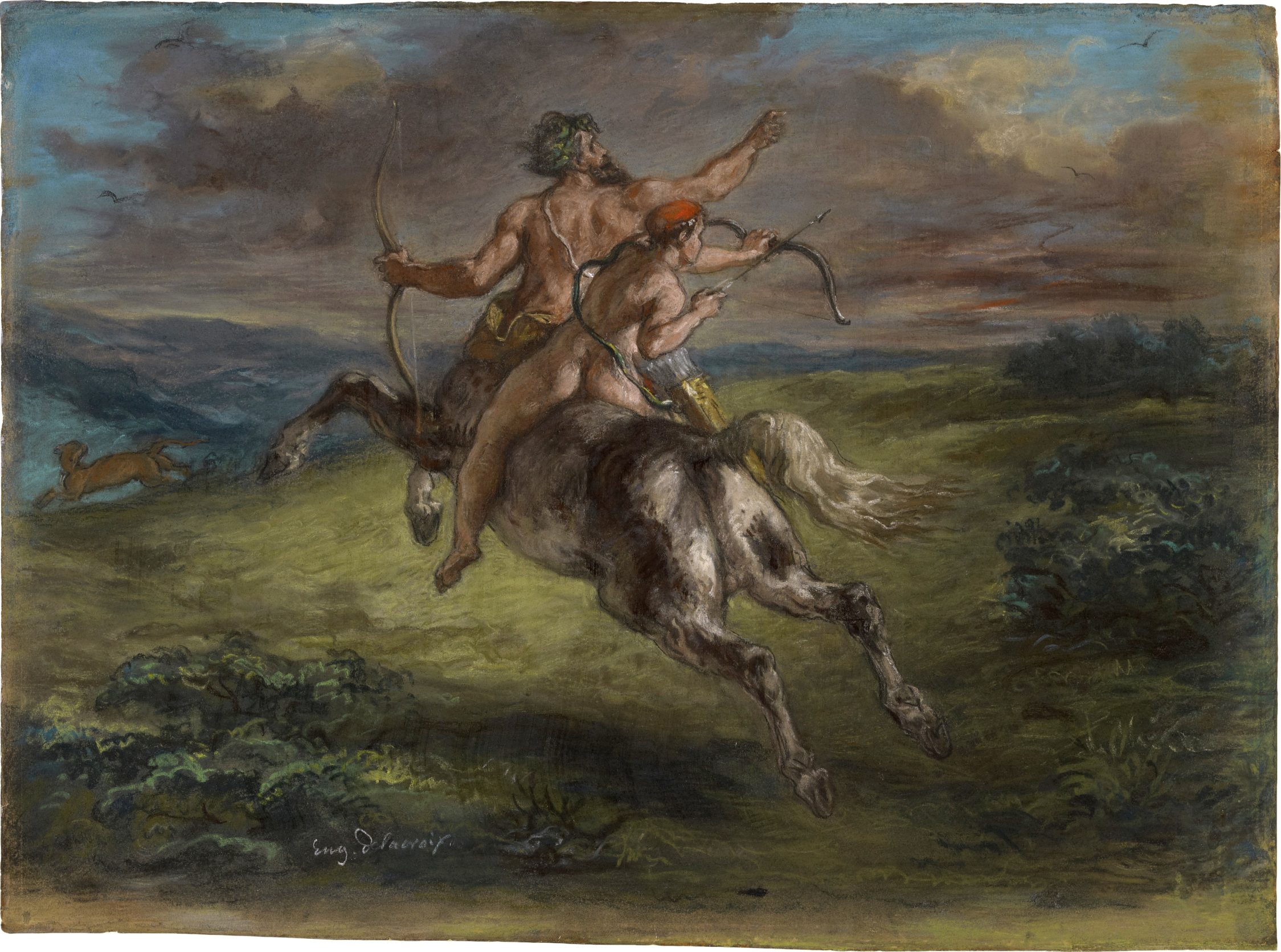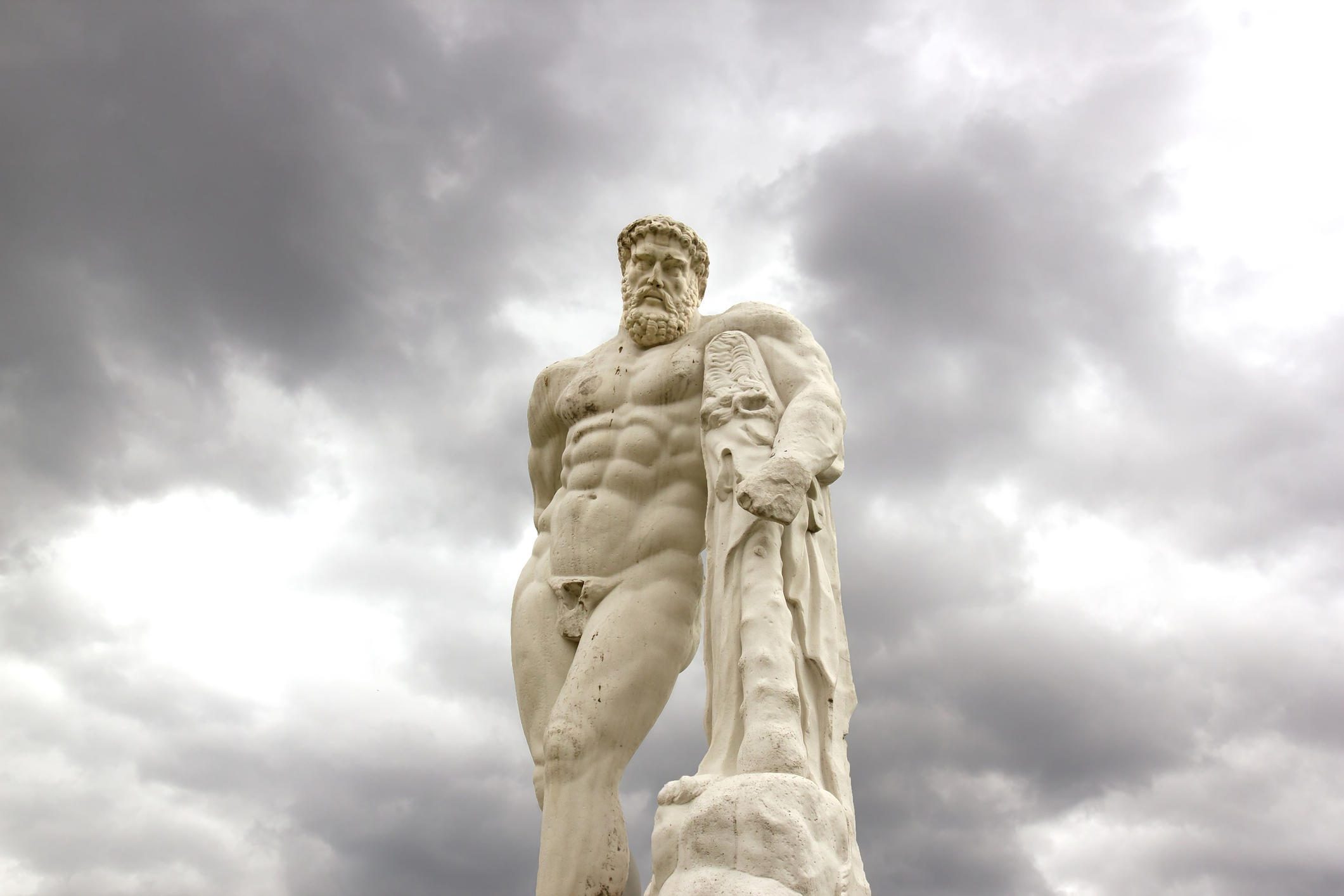An underappreciated film showcases post-war masculine anxieties.
Wat iz Bronze Age Mindset?

Any critique of the online right needs a full understanding of its ethos.
A specter is haunting the right-wing world—the specter of Bronze Age Pervert. His book, Bronze Age Mindset, has been a breakout hit among certain segments of the Very Online Right—prompting a response, first from Michael Anton in the Claremont Review of Books, and then from various authors in these pages. What is it in Bronze Age Mindset that has captured the interest, not only of anonymous “frogs” on Twitter, but of the right-wing intelligentsia? And what—if anything—can conservatives learn from the book, and from the phenomenon it typifies?
Bronze Age Pervert, as he styles himself, is an enigma wrapped in a mystery. His identity, not to mention everything else about him, is unclear. One thing, however, is apparent: the ideas he promotes have struck a serious chord, especially among the predominantly young male denizens of the right-wing internet. This alone makes BAM worth engaging with.
Engaging with BAP and his work is, of course, a difficult task: BAM is riddled with neologisms, peculiar locutions, and references to layers upon sedimentary layers of memetic discourse which only an insider could possibly hope to comprehend. It could be argued, of course, that this alone justifies ignoring the book and its author, chalking their uncanny success up to a bizarre fluke, and returning comfortably to our copies of Burke and the latest issue of the New Criterion. But this would be a mistake, as Bronze Age Pervert has something profound to teach us about the current state of civilization.
Before examining the positive content of Bronze Age Mindset, however, it is important to make clear what it is not. The book is subtitled “An Exhortation,” and an exhortation it is: it is not a book of philosophy. Readers expecting to encounter an organized system of thought will be disappointed. (This, as noted by BAP himself in his rejoinder to Anton, was the main weakness of Anton’s otherwise fine review. He examined BAM as a work of political philosophy, and this set the tone, more or less, for the discourse which followed.)
To examine BAM on its own terms, then, it is necessary to follow the advice of the King of Hearts and “begin at the beginning.” “I was roused from my slumber by my frog friends and I declare to you, with great boldness, that I am here to save you from a great ugliness,” BAP writes in his Prologue. This theme of “a great ugliness” will occupy BAP, in one form or another, for the rest of the book.
Bronze Age Eloquence
And what a book it is! Written in what can only be described as message-board patois, BAM is unsystematic in the best way. Its contents run the gamut from anecdotes about the author’s exploits in red-light districts to Schopenhaurian excurses on will to meditations on ancient Greek etymology. Its organization and style seem to be a conscious imitation of Nietzsche (a fact which is useful for judging whether or not the book succeeds on its own terms). And in true Nietzschean fashion, BAP seems to feel himself unconstrained by orthodoxy, intelligibility, or even basic grammar. Nonetheless, the book is surprisingly readable, and BAP’s style frequently slips from his idiosyncratic pidgin to surprising eloquence, not to say grandiloquence.
Much like his hero Nietzsche (whom he cites by name over twenty times, always approvingly), BAP writes in a style that is terse, epigrammatic, and designed to provoke thought. Consider these bons mots, just a small sampling of BAP’s many enigmatic interjections, which I include here not only because they are relevant to a discussion of the style and content of the book but also simply because I think they’re worth reading:
When they say they are atheists, I never believe them: atheists act like Stalin or Brezhnev, not like a Presbyterian schoolmarm.
…
[T]he moral meaning imposed on reincarnation by Buddhism and Hinduism is, like Plato’s, for reasons of social utility and is political.
…
No great discovery has ever been made by the power of reason. Reason is a means of communicating, imperfectly, some discoveries to others, and in the case of the sciences, a method of trying to render this communication certain and precise. But no one ever made a discovery through syllogisms, through reason, through this makeshift form of transmission.
Of course, such insights are not the sole contents of the book. At times BAP seems to be trolling the reader, testing him, seeing how much he can take before he will close the book in exasperation. Take Chapter 35, for instance, which I quote in full here:
Should the tyranny that has descended on our age ever gain the power it seeks and then be challenged enough to feel itself in danger, the mass annihilations that will be carried out by homosexual, transsexual, and especially lesbian commissars will exceed in scale and cruelty anything that has yet happened in known history. Imagine lesbian mulatta commissars with young Martin Sheen face and haircut manning the future Bergen-Belsens, installations that will span tens of miles.
One can’t help but wonder, reading passages like these, if BAP is even serious. Indeed, this may be the most dangerous part of the book and the irony-poisoned milieu from which it emerged: the near-total erosion of the line between irony and sincerity. Perhaps BAP is serious here; perhaps he isn’t—but does it even matter? BAP would, of course, contest this, writing in a chapter entitled “Whoremoans” that “[t]here is no irony here: I don’t do irony! Learn that I don’t understand the gay idea of ‘irony’.” And yet the entire passage in which these sentences appear is written in a pervasive spirit of irony; it’s as if BAP is playing a game of semiological chicken with his readers: “just how seriously are you going to take me?”
Given what I take to be BAP’s all-consuming irony (perhaps a better term would be levity), the most dangerous parts of the book are not, as Anton argues, the bit at the end where BAP seems to endorse piracy, or where he recommends Alcibiades as a model of his ideal way of life. If there is danger in Bronze Age Mindset, it lies in the overall spirit of the work. Various aspects of this have been discussed—his nihilism and relativism, his attitude toward manliness, and so forth—but thus far no critic of the work has painted a comprehensive picture of the Bronze Age Ethos, something which is surely a prerequisite for a critique.
Wat Means?
To paraphrase Augustine, “what, then, is BAP?” What is the positive content of his message? What is it that has drawn so many people to that message? And what, if anything, can conservatives draw from it?
Bronze Age Mindset is, fundamentally, a gospel of sun and steel (a phrase BAP borrows from Yukio Mishima’s autobiographical essay; Mishima is one of few people who BAP seems to take as a role model), but to what end? BAP answers this question in Chapter 15: he seeks “the life of the immortal gods who live in pure mountain air, and the sign of this life, where energy is marshaled to the production of higher order, is the aesthetic physique, the body in its glorious and divine beauty. The opposite of this godly life is “the surfeit of flesh we see on the obese and in general the lassitude, the spiritual obesity…the life of the human animal collapsed to mere life, life for the sake of life, as it devolves to the yeast form aesthetically, morally, intellectually, physically.”
What BAP refers to as “yeastlife” is, he tells us, the default condition for most of human history in the vast majority of times and places. His candor here is refreshing: most people would simply blame this phenomenon on modernity, and BAP’s consistent refusal to do so is admirable. It is not with this “yeast” that BAP concerns himself, but with those who possess the potential for something more, something greater. In short, he wishes us to be like the gods, the gods that he believes surely exist even as he waffles on the question of a capital-G God. The words “Victory to the Gods” appear as the epigraph to the book, and the only definition of the “Bronze Age Mindset” which is ostensibly the theme of the entire book is this: “The secret desire of every Greek…the Bronze Age mindset…was to be worshiped as a god!”
BAP, like the ancient Greeks he takes as his model, identifies this striving for godliness with the pursuit of beauty. This is most readily apparent on his Twitter feed, which consists mostly of shirtless photos of bodybuilders—not, he assures us, for any homoerotic reasons, but simply because they are beautiful. (It is commendable, incidentally, that BAP has nearly singlehandedly transformed the image associated with the online right from that of a bunch of overweight racists to that of bodybuilders reading Greek.) He is obsessed with beauty; his main enemy, therefore, is ugliness. He sees this ugliness everywhere; in fact, for him, it is the baseline condition of existence.
It is in service of this project, not as a result of mere animus, that BAP condemns or dismisses large groups of people in terms distasteful to the genteel establishment. Despite emerging from the fever swamps of the right-wing interwebz, BAP is not some sort of Nazi-adjacent goon. Nor is he the type of rank antisemite one would expect to encounter on 4chan. He is, admittedly, something of a misogynist, but his misogyny is not the crude hatred of contemporary “men’s rights activists”; if anything, it more closely resembles the classical anti-feminism of Hesiod. But mostly it seems to be an outgrowth of BAP’s focus on the heroic male: women are not so much hated in Bronze Age Mindset as they are relegated to the side.
After the Fire
Try as BAP may to deny it, there is a coherent strand of thought running through Bronze Age Mindset, and it is typified not only by his exhortations to greatness and manly strength, but by passages like this one:
Some talk about this “madness behind things.” The real world is very different from the one that appears to us in waking life, but it’s not so different as to be entirely alien or abstract or “philosophical” in the way you might think. It’s not abstract, or made of perfect and eternal forms, it’s not somewhere else: it’s immanent, here, and within things, and it’s twisted. It doesn’t have any moral significance that can be understood by us. When Heraclitus speaks of all things being one, and all things being fire, he means this: when this actually shows itself to you, there is a demoniac and violent madness underlying things. The real world is similar to the apparent, but uncanny, devilish, disordered for us.
Here we have the nucleus of BAP’s thought about the world in as concise a form as ever we will, and it is worth examining it closely. The hallmarks of the Bronze Age Pervert are all here: the stream-of-consciousness style, disorganized yet flowing, is a telltale sign that this is a passage to be noted well; the focus on what Nietzsche called the Dionysian, which BAP identifies with the Heraclitan fire; and most of all, in the last sentence, the deep, Schopenhauerian pessimism—all of these are no less important to the understanding of BAP’s thinking than the pictures of Pietro Boselli and the neologisms of BAP’s internet pidgin.
So what, exactly, is the teaching of Bronze Age Mindset, and why is it so attractive to so many young men? The answer, I think, is simple: it is a revitalized paganism, obsessed with strength and beauty. It appeals to today’s young men because these things—strength and beauty—are exactly what contemporary society has tried so hard to deny them. The gospel of sun and steel, of vitalism and strength and power, are exactly what have been denied to the boys of the Western world, and their spirits militate against this. Everything great ever achieved, BAP tells us, was done “through strong friendships between two men, or brotherhoods of men, and this includes all great political things, all acts of political freedom and power.”
Throughout the entire book, I do not think I can recall a sentence more fundamentally true. BAP’s willingness to shatter every cultural taboo—to tell men that it’s okay to be men, that there’s more to masculinity than sitting in an office all day, a call to resist the decadence of a culture that has forgotten even the basic facts of biological reality, resonates deeply with today’s Lost Boys. To inspire men to excellence, to invite them to strive for greatness, nay, godliness—this is the positive content of BAP’s philosophy, and this is why it has become so popular. All else is chaff.
But is it enough? Will the recrudescent paganism of Bronze Age Mindset be enough to satisfy the souls of men? This, I think, is the most fundamental divergence between the “frogs” and the conservatives. BAP’s message is fundamentally one of strength, of the recovery of classical manliness, of Greek friendship, and of “nature, beauty, physical fitness, the preservation of high traditions of literature and art”: in short, a renaissance of culture. So we must ask ourselves: will culture be enough?
Or is something more required? Matthew Arnold famously defined culture as “sweetness and light,” but are sweetness and light enough to guide the souls of men? Or will Homer and bodybuilding turn out to be, as Eliot said, rather thin soup?
BAP, as mentioned earlier, recommends Alcibiades as the archetype of manhood. But we must remember, as Socrates pointed out, that there is one indispensable thing Alcibiades lacks: an understanding of justice. In fact, the very same Homeric epics that BAP praises, for Socrates, depict arguments over the nature of justice. This ought to point not towards the cynical Thrasymachean rule of the stronger but to meditation on virtue—a word which BAP only brings himself to use disparagingly. In short, BAP’s vision has to recommend it all the strengths of classical paganism, but it also has arrayed against it all its weaknesses. His Schopenhauerian pessimism is entertaining, but in the end it is, as BAP’s hero Nietzsche noted, nothing but another form of decadence. BAP is doubtless right that neither Ben-Op idealism nor integralist LARPing will get us out of the mess we’re in, but those camps are just as certainly correct that neither will sun and steel alone. (After all, BAP isn’t the first right-wing Nietzschean to advocate piracy as a solution to collapse…)
In short, Bronze Age Mindset ought to be viewed as a stepping stone, a useful bridge from the weakness of modern man to virtue and greatness, but nothing more. What is that something more? His acolytes, and all young men, must search now for the answer.
The American Mind presents a range of perspectives. Views are writers’ own and do not necessarily represent those of The Claremont Institute.
The American Mind is a publication of the Claremont Institute, a non-profit 501(c)(3) organization, dedicated to restoring the principles of the American Founding to their rightful, preeminent authority in our national life. Interested in supporting our work? Gifts to the Claremont Institute are tax-deductible.
Tucker Carlson's new documentary terrifies the Left.
The incoherence of feminist ideology is right there on the surface.
Our nation’s priority should be fixing its men.
Desperation and depression mark American masculinity.
In defense of sex-segregated times and places.






